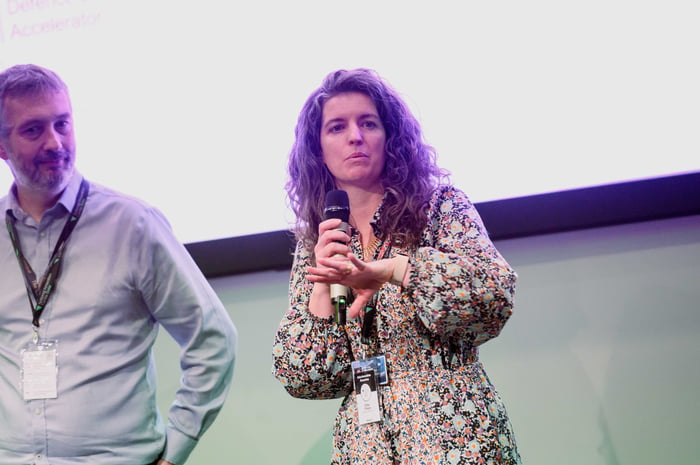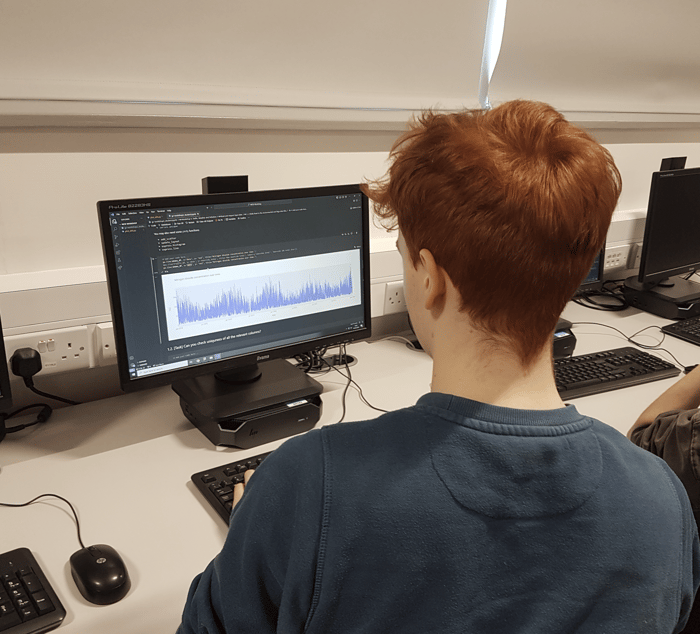
I. Introduction
Organisations of all sizes, in all sectors, are drowning in data. This frustrates our leaders in industry and the public sector, who are keen for their organisations to develop the data skills to realise this potential [1]. Harnessing the power of new insights leads to new products and services, more efficient business operations and improved decision-making.
The lack of skills remains an international problem. The increase in demand and lack of supply of skills is inflating salaries for data scientists. When multi-nationals are affected by the skills shortage, smaller companies often cannot afford to hire at all. Small to medium sized companies (SMEs) are an important part of the economy in most countries (often over 95% of the private sector base) and so ignoring them is not an option.
In contrast, universities worldwide are filled with researchers with the skills to extract value from data. This includes computer scientists and mathematicians driving the development of new models; and people in science, engineering, healthcare and the humanities routinely applying data science and AI methods to gain new insights and build new solutions to transform their field. It has long-since been clear that unlocking expertise in our universities can hugely benefit our economy and society – but doing so, has proved challenging.
II. The challenge of unlocking the expertise held within universities
In the UK, the quality of universities is measured from three main perspectives: research; teaching; and external engagement. Most academics are expected to contribute to both research and teaching, and encouraged to seek-out engagement opportunities. However, shaping and delivering successful university-driven projects that has a real impact outside the institution, is often impeded by:
- Timescales: where companies often require a short-term return on investment, which often rules out longer-term, riskier projects that are most common in academia.
- Lack of Potential for Driving Research: when existing methods (e.g. statistical or machine learning) are sufficient to extract value from data to address the challenge or opportunity faced by an organisation. This means researchers are often unable to demonstrate a contribution to knowledge – and even novel projects may be subject to confidentiality.
- Funding: as companies do not always have resources available for academics to work on their projects – and even when a government grant is available, this often delays the start of the work and may make it impossible to meet the company’s tight timescales.
- Scale: A recent report [2] identified 234,000 unfilled roles in data science in the UK alone.
Given these challenges, in 2017 an alternative approach to driving impact in the economy and society was developed; with £30m investment from the UK government and Newcastle University in creating the UK’s National Innovation Centre for Data.
III. The National Innovation Centre for Data
The National Innovation Centre for Data (NICD) [3] was a robust response to the data skills shortage holding back business and government. NICD is based around a new type of collaborative project to transfer skills into organisations who need them. NICD has a dedicated team of data scientists with skills ranging across the spectrum of advanced tech; including AI; Statistics; Data Engineering and Visualisation – all working full-time on NICD’s collaborative skills transfer projects, to help companies, public organisations and charities to better understand and benefit from their own data.
IV. Our process for driving success
NICD’s Discovery Workshop is the first stage of any data science project. This enables our team to understand the client’s need and aspiration and helps both partners to understand what a further project would look like. NICD has carried out 160 Discovery Workshops with key members of an external organisation. This includes both their ‘technical’ and ‘strategic’ staff, as we identify the real business challenge or opportunity the client faces, shaping a project to address this. Around half of Discovery Workshops have led to contracts – and even clients who chose not to move to a Data Skills Project find the Discovery Workshop useful; highlighting key issues for the company to address.
NICD has run 80 successful projects that have had a real impact on a range of clients; from multi-nationals to start-ups, and from Government departments to charities [4]. These clients have been drawn from across sectors of the economy including manufacturing, energy, healthcare and banking. Three key factors in the success of NICD projects include:
- NICD simply charges time to projects - we retain no Intellectual Property; and focus solely on insight and upskilling for the client. We find that this ethos greatly reduces the time and cost in moving from Discovery Workshop to full project.
- Our projects are collaborative. A team combining staff from the client and NICD work together, addressing the business opportunity, on the client’s own data and on their own infrastructure.
- Skills are transferred from NICD experts to the client. This builds capacity in the organisation beyond the life of the project; so, clients can continue to enhance productivity, grasp opportunities and meet future challenges without being dependent on NICD staff. We are very different from private consultants.
Our process drives success and ensures we do not take key employees away from their “day job” for external training, which can often be generic and not focused on client needs. In small organisations, it is often impossible to relieve key staff of all their responsibilities for the duration of a project.
Therefore, most NICD projects are structured so that people are only needed for a portion of each week. A typical project will involve 30–90 days of NICD and client staff time, spread over three to six months. We leave collaborating organisations with a solution they understand, which they can continue to develop using their own in-house talent and skills they have built through working with the NICD team.
V. Achieving impact
Our results show that the NICD model works. It delivers actionable insight and valuable enduring outcomes for project partners. The following Case Studies illustrate the benefits of upskilling in data/AI whilst focusing on a real business problem.
.png?width=1024&height=768&name=Infographic%20Table%20for%20Case%20Studies%20(1).png)
VI. Future potential
We are always keen to share learnings from the success of the NICD model. In 2023, we began to work more closely with policymakers to share insight and build new collaborations locally, nationally and internationally. These included contributing to an All Party Parliamentary Group report: ‘Tech for Good, Tech for Growth’; and joining the Secretary of State for Science, Innovation & Technology’s (DSIT) Mansion House dinner as part of the Global AI Summit. In 2024, we are ready to apply our data science skillset and experience of working with businesses of all sizes and the public sector, to support more national policy challenges. We are proactive in engaging Civil Servants, Ministers and Shadow Ministers, but would always encourage policymakers who are interested in working with us to reach out.
And in our own region, NICD supports the university, the North East, and all of our partners to ensure that more people and businesses can develop and utilise data science skills to make a positive difference for themselves, and for all of us. Having worked closely with the existing North Tyne Combined Authority and other local government partners, we are currently working with Officers setting up the enlarged North East Mayoral Combined Authority to help ensure our data science skillset can deliver on the ambition which our citizens, businesses and local leadership have for our home region.
Recognising that the opportunities and challenges of new technologies are international, as set out by the DSIT Secretary of State at the Global AI Summit – we can also play a role in unleashing new ideas to build and support strong global partnerships. We believe that the National Innovation Centre for Data model is replicable in different geographies and are looking to work with partner universities worldwide to drive innovation in companies and public organisations. Each centre would naturally build-up a regionally-focused set of projects – while NICD-led meetings and events will bring together Centres to ensure best practice was transferred between them, both nationally and internationally.
This article has been written by Director of National Innovation Centre for Data, Professor Paul Watson, Director of Strategy, Professor Barry Hodgson, with input from Danny Dickinson, Policy Lead.
You can read more of our case studies and sign up to our newsletter to keep up to date with our latest news, events and developments.
References
[1] J. B. Hodgson and A. Kontaratou, “Embracing Data In Engineering” Ingenia, Royal Academy of Engineering, Issue 93, pp. 17–22, December 2022
[2] UK Government, “Quantifying the UK Data Skills Gap”, 18 May 2021, https://www.gov.uk/government/publications/quantifyingthe-uk-data-skills-gap/quantifying-the-uk-data-skills-gap-full-report, retrieved 14 August 2023
[3] The National Innovation Centre for Data, “The National Innovation Centre for Data”, https://www.nicd.org.uk, retrieved 14 August 2023
[4] The National Innovation Centre for Data, “Case Studies”, https://www.nicd.org.uk/case-studies, retrieved 14 August 2023
[5] The National Innovation Centre for Data, “Meet the Team”, https://www.nicd.org.uk/meet-the-team, retrieved 14 August 2023


